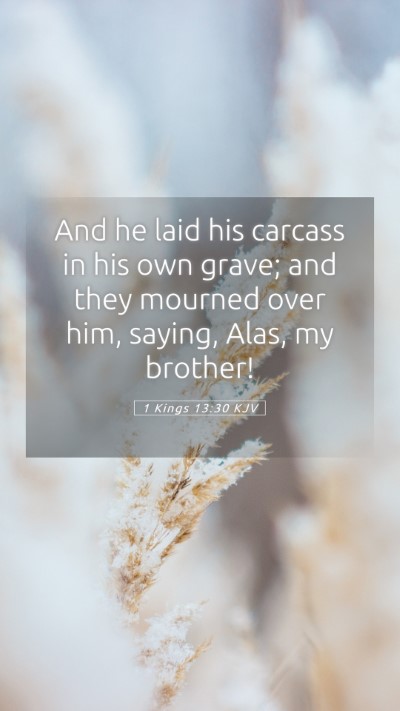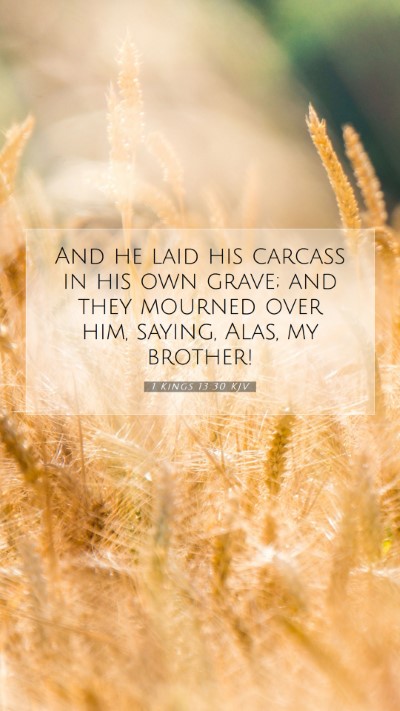Understanding 1 Kings 13:30
Bible Verse: 1 Kings 13:30 - "And he laid his carcass in his own grave; and they mourned over him, saying, Alas, my brother!"
Bible Verse Meaning
This verse is a poignant conclusion to the account of the man of God who prophesied against the altar at Bethel. After being deceived by King Jeroboam and ultimately meeting a tragic end, his body is buried, and there is mourning for him. The death of this prophet serves as a sobering reminder of the importance of obedience to God's commands.
Bible Verse Interpretations
-
Matthew Henry: Henry emphasizes the prophet's tragic disobedience and the serious consequences of straying from God’s commands. He notes that the mourning signifies respect for the man of God's sincerity, despite his failure.
-
Albert Barnes: Barnes reflects on the symbolism of burial as a return to the earth, contemplating the prophet’s fate as a warning. He points out the contrast between the honor given in death and the disobedience that led to it, illustrating a deep moral lesson.
-
Adam Clarke: Clarke focuses on the emotional aspect, noting the grief expressed by those who lived in the region. This lament highlights the prophet's role and the impact of his life and death within the community.
Bible Verse Understanding
The events surrounding this verse illustrate key themes in the biblical narrative: divine judgment, the grave consequences of disobedience, and the enduring legacy of prophetic voices. The Israelite context underscores the significance of adhering to God's directives while also acknowledging human frailty.
Bible Verse Commentary
Commentaries from various scholars provide the following insights:
- Judgment and Mercy: This verse reflects the dual nature of God's interaction with humanity - justice is served, yet grace is extended through mourning and remembrance of the prophet.
- Symbolism of Burial: Burial symbolizes a return to God, and honor is associated with the deceased's prophetic office, despite his flaws.
- Community Response: The public mourning reflects the communal aspect of faith, indicating the influence of the prophet and the regret over his choices.
Historical Context of 1 Kings 13:30
This passage is situated during a turbulent period in Israel's history when the kingdom was divided. The Northern Kingdom, led by Jeroboam, faced idolatry and a departure from Yahweh's worship, which underscores the urgency of prophetic messages in that climate.
Application of 1 Kings 13:30
For modern readers, this verse serves as a somber reminder of the importance of obedience to God's directives. It alerts believers about the potential outcomes of disobedience and the valuable nature of community and legacy in spiritual contexts.
Cross References
- 2 Kings 23:17: Reflects on the desecration of false altars and the importance of true worship.
- 1 Samuel 15:22: Highlights the significance of obedience over sacrifice.
- Hebrews 11:32-34: Mentions the prophets and their faith, reinforcing their roles as messengers of God.


